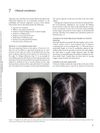1 citations,
December 2015 in “TURKDERM” Lichen planopilaris can be accurately diagnosed and effectively treated.
 1 citations,
September 2015 in “Clinics in Dermatology”
1 citations,
September 2015 in “Clinics in Dermatology” The guide helps doctors diagnose hair problems by suggesting a thorough patient history, physical exams, and various diagnostic tools.
 1 citations,
September 2013 in “Elsevier eBooks”
1 citations,
September 2013 in “Elsevier eBooks” Hair ages and thins due to factors like inflammation and stress, and treatments like antioxidants and hormones might improve hair health.
 1 citations,
April 2012 in “Informa Healthcare eBooks”
1 citations,
April 2012 in “Informa Healthcare eBooks” The conclusion is that detailed clinical descriptions help pathologists diagnose hair loss conditions more accurately.
 1 citations,
September 2011 in “Journal of Dermatology”
1 citations,
September 2011 in “Journal of Dermatology” A woman with a new PTCH gene mutation has both Gorlin syndrome and severe hair loss.
 1 citations,
March 2004 in “Journal of The European Academy of Dermatology and Venereology”
1 citations,
March 2004 in “Journal of The European Academy of Dermatology and Venereology” Hair loss improved with treatment and successful transplant.
 1 citations,
February 1988 in “The BMJ”
1 citations,
February 1988 in “The BMJ” The document explains different hair and scalp conditions, including common hair loss after pregnancy or illness, drug-induced hair loss, hereditary excessive hair growth, patterned baldness, autoimmune hair loss, and permanent loss due to skin disease, with generally limited treatment options.
 July 2024 in “Revista Científica de Estética e Cosmetologia”
July 2024 in “Revista Científica de Estética e Cosmetologia” The babassu fiber exfoliating product for hair loss should be stored in a cool place to stay effective.
 April 2024 in “Journal of dermatology research reviews & reports”
April 2024 in “Journal of dermatology research reviews & reports” Using a laser helmet with Minoxidil works better for male hair loss than Minoxidil alone, with no extra side effects.
 September 2023 in “Journal of movement disorders”
September 2023 in “Journal of movement disorders” Dopaminergic therapy in Parkinson's disease patients is linked to increased hair loss.
 August 2023 in “Anales de la Facultad de Ciencias Médicas”
August 2023 in “Anales de la Facultad de Ciencias Médicas” The patient with lupus and hair loss improved with oral and topical minoxidil.
 April 2023 in “Dermatology practical & conceptual”
April 2023 in “Dermatology practical & conceptual” Tacrolimus solution is effective and well-tolerated for treating inflammatory scalp conditions.
 June 2022 in “bioRxiv (Cold Spring Harbor Laboratory)”
June 2022 in “bioRxiv (Cold Spring Harbor Laboratory)” ILC1-like cells can cause alopecia areata by attacking hair follicles.
 April 2022 in “Medicinus”
April 2022 in “Medicinus” Effective treatments for common hair loss are limited and may have side effects, leading to patient disappointment and treatment discontinuation.
 August 2021 in “Research, Society and Development”
August 2021 in “Research, Society and Development” Minoxidil slightly increased hair volume more than Finasterida, but both reduced hair loss similarly.

Alopecia Areata has no cure, treatments are limited, and the condition often recurs, but new therapies like JAK inhibitors show promise.
 January 2021 in “Skin appendage disorders”
January 2021 in “Skin appendage disorders” The report concludes that atypical Brauer nevus is more common in males, present at birth, and often misdiagnosed due to its unusual scalp locations.

People with androgenic alopecia are more likely to have metabolic syndrome than healthy individuals.
 January 2019 in “Clinical neuropharmacology”
January 2019 in “Clinical neuropharmacology” A girl's hair-pulling condition improved greatly after she started vitamin D treatment.
 December 2018 in “Neuroradiology”
December 2018 in “Neuroradiology” MRI helps distinguish between pituitary adenomas and craniopharyngiomas, guides treatment for pediatric CNS tumors, and assesses rhinocerebral mucormycosis with a high mortality rate in transplanted patients.
 December 2018 in “Meandros medical and dental journal”
December 2018 in “Meandros medical and dental journal” A man developed a rare late-onset hair-pulling disorder, usually seen in younger people.
 October 2018 in “InTech eBooks”
October 2018 in “InTech eBooks” The most effective treatments for hair loss are minoxidil, finasteride, PRP, and hair transplants, with steroids and immunosuppressants for autoimmune types.
 August 2017 in “Journal of evolution of medical and dental sciences”
August 2017 in “Journal of evolution of medical and dental sciences” Trichoscopy is effective for diagnosing different types of non-scarring hair loss.
 December 2014 in “Bali Medical Journal”
December 2014 in “Bali Medical Journal” Females have higher estrogen receptor levels in hair than males, and these levels decrease in white hair compared to black hair.
 September 2014 in “Springer eBooks”
September 2014 in “Springer eBooks” Aging causes hair to gray and thin, with the timing of graying varying by race, and factors like oxidative stress and genetics can lead to hair loss.
 March 2012 in “Journal of The American Academy of Dermatology”
March 2012 in “Journal of The American Academy of Dermatology” Dermoscopy helps diagnose different hair loss conditions, and characteristics vary among ethnicities and individual cases.
 March 2012 in “Journal of The American Academy of Dermatology”
March 2012 in “Journal of The American Academy of Dermatology” A 7-year-old boy's unusual hair loss was caused by a herpes infection and healed after treatment.
 January 2009 in “Indian Journal of Plastic Surgery”
January 2009 in “Indian Journal of Plastic Surgery” Surgical methods for hair loss due to scarring should be chosen based on the size, location, and shape of the area, with most patients seeing good results.
 January 1991 in “Journal of Pediatric Health Care”
January 1991 in “Journal of Pediatric Health Care” Hair loss in children can be caused by fungal infections, trauma, autoimmune disorders, or stress, and treatments vary depending on the cause.

The document concludes that most hair loss treatments don't work, balding isn't caused by dandruff, and hair loss may indicate serious health issues that require medical attention.




























